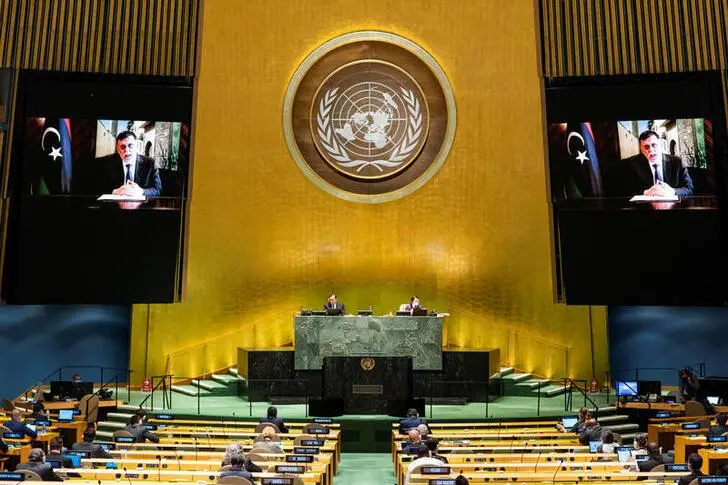PHOTO
The 76th UN General Assembly’s high-level debate is scheduled to run from Sept. 21-27 but, unlike last year, when all the gatherings were held virtually, at least 80 leaders are expected to attend in person, along with their delegations, despite a US request that the debate be mostly virtual. The pandemic will almost certainly dominate the leaders’ discussions in New York City.
Few people follow the UNGA meetings, which are dominated by lengthy and carefully worded speeches by political leaders, some of whom speak to an almost empty chamber. But the in-person gatherings offer opportunities for one-on-one discussions and behind-the-scenes deliberations. The public perception is that the UNGA is mostly a sterile and anachronistic club of nations that offers a platform for authoritarian leaders, while giving the false impression that all nations are created equal.
The real power lies in the Security Council. Even then, the UN body often shows signs of political deadlock when one or more of the five permanent members exercise their power of veto.
Nevertheless, the UN’s other affiliated bodies, such as the World Health Organization, the World Food Program, UNESCO, UNICEF and the UN High Commissioner for Refugees, have made great contributions in a troubled world since the end of the Second World War. Despite the harsh criticisms directed at the WHO following the outbreak of the pandemic, the body has played an instrumental role in supporting efforts to produce effective vaccines, as well as organizing plans for the equitable distribution of vaccines through the COVAX initiative.
Furthermore, its role in global vaccination campaigns against polio, smallpox and other diseases, as well as in curbing the spread of dangerous viruses such as Ebola, cannot be denied.
Likewise, the role of the UNHCR and WFP in helping millions of refugees and displaced persons affected by conflicts around the world must be recognized. The General Assembly approves the budget of these essential organizations.
So what to expect from this year’s UNGA meetings? The US withdrawal from Afghanistan and the fall of Kabul to the Taliban will likely dominate the discussions. The US will reiterate its commitment to continuing the fight against global terrorism. Its leadership remains crucial to containing militant extremists. That message will be important following the Afghanistan debacle.
But Afghanistan will be a polarizing issue. The question of who will speak for that country at the UN will present itself, since some nations are on their way to recognizing the new regime. Protecting the rights of women, children and minorities will also be discussed, as human rights groups push for talks on the issue.
On the other hand, Afghanistan also presents a humanitarian challenge, with more than 50 percent of the population dependent on international assistance. Facilitating the supply of aid and protecting international agencies working on the ground will require a strong commitment from the new regime.
Another issue that will certainly be discussed is the pandemic and where the world is heading with the spread of new variants and doubts about the efficacy of vaccines. US President Joe Biden is said to be ready to announce new global vaccine aid before the UNGA meetings. Biden is weighing up a multilateral meeting ahead of the UN leaders’ sessions aimed at vaccine supply, and has said he will announce new vaccine measures this month.
Aside from the health issue, there are the economic and social side effects of the pandemic. Many countries have seen their economies slump as a result of months of lockdown. There will be calls by poorer nations for a global initiative to provide aid and loans to those that are struggling economically.
The Iran nuclear deal will also feature in the meetings. Like his predecessor Benjamin Netanyahu, Israeli Prime Minister Naftali Bennett will make a case — whether he attends in person or virtually — against Tehran’s nuclear program. Last week, he called on the international community to act immediately against Iran after the UN nuclear watchdog reported that the Islamic Republic had dramatically increased its production of highly enriched uranium in recent months and is refusing to allow full inspection of its activities. “The naive expectation that Iran will be prepared to change its path via negotiations has been proven to be baseless,” Bennett said.
The US has hinted that time is running out and that it is closer to giving up on the nuclear deal. It will be interesting to see if Iran’s President Ebrahim Raisi flies to New York — he is the subject of international sanctions — or if he will speak to the assembly virtually.
Lastly, the Palestinian question will feature yet again in the meetings, even though Bennett has made it clear there will be no political process with the Palestinians. All Israel is willing to offer at this stage — backed by the US — are economic incentives to keep the Palestinian Authority from collapsing.
The Palestine issue, the oldest on the UN’s agenda, is further proof of the failure of the international body to implement its own resolutions, leaving the conflict to fester.
- Osama Al-Sharif is a journalist and political commentator based in Amman. Twitter: @plato010
Copyright: Arab News © 2021 All rights reserved. Provided by SyndiGate Media Inc. (Syndigate.info).





















